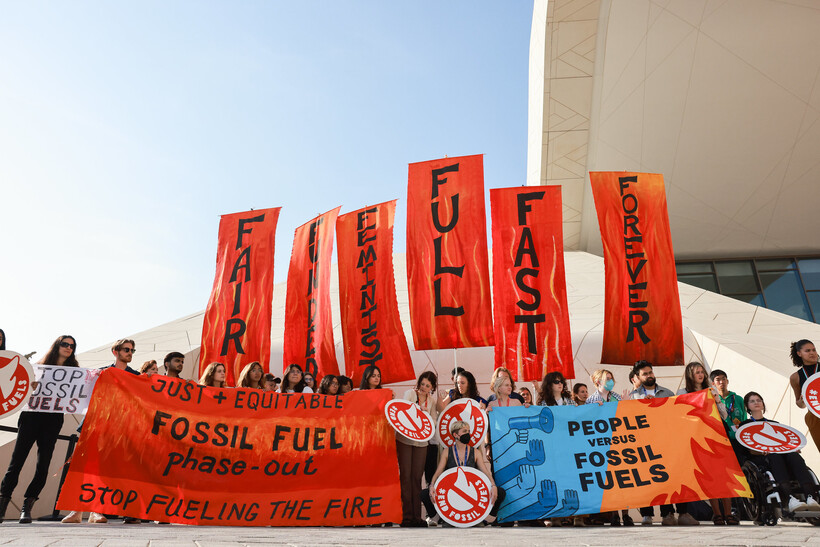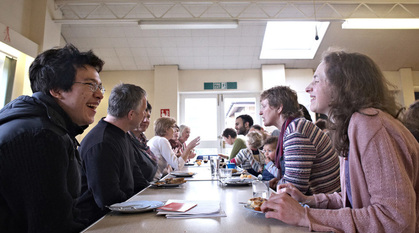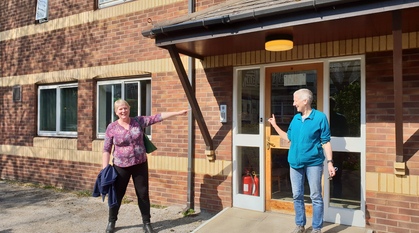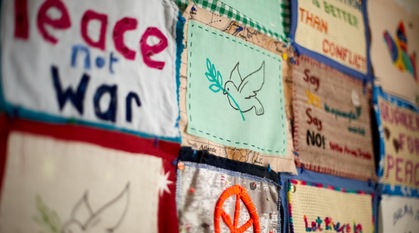Reflecting on COP28 – where next for climate justice?
COP28 saw a breakthrough on funding loss and damage and a shift away from fossil fuel dependence. But it stopped short of the scale of action and ambition we need. Rebecca WalkerWoo explores how.

Another set of annual UN climate talks has come to a close and many are sitting with mixed feelings. COP28 brought some unexpected welcome developments but it also saw a worrying increase in the potential for capture by the fossil fuel industry.
Filling the bucket for loss and damage
COP28 opened with a flood of announcements from countries that they would add money to the Loss and Damage Fund to compensate communities experiencing the devastating impact of the climate crisis. Thanks to sustained campaigning on loss and damage, we're no longer talking about mechanics.
Commitments ran the gamut with bigger sums from the host (the UAE) and Germany ($100m each), as well as France and Italy ($108m each), to a paltry $17.5m from the US. The UK came in middling, with an announcement of £40m, plus another £20m for loss and damage related investment.
But it wasn't all good. While we welcome countries putting money into the bucket, many of the commitments are not new and additional – a key ask for loss and damage finance. For example, the UK's pledge comes from the existing commitment of £11.6 billion for climate finance and 0.5% GNI for Overseas Development Aid.
[QUOTE-START]
In the Loss and Damage Fund, which is the fund that is meant to help frontline communities and countries overwhelmed by climate crises, the US put in a paltry 17 million dollars, but the very next day announced billions of dollars in military aid to Israel. People see this and [understand] that some lives are worth more than others.
- Asad Rehman, Climate Justice Coalition
[QUOTE-END]
With the estimated annual cost of loss and damage standing at $400 billion a year and rising, the $700 million pledged to the fund was less than 0.2% of the amount needed. This is a familiar picture across climate funding. And it pales in comparison to global military spending ($2240 billion) or the staggering profits made by fossil fuel companies in 2022 alone ($4 trillion).
Ending fossil fuels
COP28 wasn't just a mixed bag for loss and damage, it was also monumental. For the first time ever the final text included a commitment to a global transition away from fossil fuels. This was a huge achievement and testament to the pressure from civil society and activists calling in a strong and united voice to “End Fossil Fuels – Fast, Fair, Forever, Feminist, and Funded".
But the final COP28 text stopped short of the commitment to phase out fossil fuels that many developing countries and climate campaigners were calling for. It is also littered with loopholes. For example, it talks about phasing down “unabated fossil fuels" and is silent on abated fossil fuel use. Abated refers to the continued extraction and offsetting of fossil fuels through geoengineering technologies – like carbon capture and storage – that haven't been proven at scale and which should only be used for the hardest to transition industries.
For more on this, you can read Quaker United Nations Office (QUNO) Representative for Climate Change, Lindsey Fielder-Cook's, reflections on the politics of fossil fuel dependence. You can also watch this conversation on shifting money and power to achieve true transformational climate action hosted by QUNO at COP28 (see in particular Professor Olaf Curry at 18:22 – 27:23).
What does 2024 hold?
After many pause for holidays around the world – a pause that is much needed and necessary after the relentless pace of campaigning for peace and justice over the last few months – we will come together again in 2024.
For loss and damage, and climate justice broadly, 2024 needs to see movement on identifying new sources of funding. We know where we can find it. As our coalition campaign to Make Polluters Pay highlights, the answer doesn't need to be complicated – if you pollute, you pay for the harm you have caused.
And we're not short of ideas. It's absolutely key that the bulk of the financing comes from those most responsible for climate breakdown. Recently updated research from Carbon Brief shows colonial rule radically shifts historical responsibility for climate change. In fact, the UK is responsible for twice as much global warming than previously thought. The UK ranks fourth in the world when accounting for colonial emissions.
In 2024, Quakers in Britain will be continuing to campaign for polluters to pay for the loss and damage they have caused and to end support for fossil fuels. We know from the last few UN climate talks that campaigning for climate justice leads to change.
At COP27 we saw the creation of a loss and damage fund and at COP28 we have seen developed countries recognising their responsibility to fill the fund. Now we need to win the argument about scale so that COP29 delivers ambitious, fair and needs-based financing. Financing to get communities experiencing climate breakdown the funding they need and financing for a true global transition away from fossil fuels.
Subscribe to the Quaker Faith in Action newsletter to be the first to hear about our plans!


